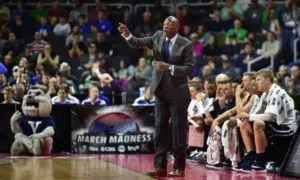When it comes to playing in the United States at an accredited institution, one of the main appeals is the education that you receive while playing your sport. But a conversation with Dr. Dave Ridpath, an Associate Professor of Sports Management at Ohio University, made it clear that the educational promise of collegiate athletics is becoming a facade. The second you become a “student-athlete,” your priorities are set for you, meaning that your sport and development as an athlete will likely take up most of your time.
Related: Rate Ohio University
A Meaningful Education?
76 percent of student-athletes are still able to get their degrees, but many finish school with degrees outside of their interest. One example that Dr. Ridpath provided me was that at one point at the University of Texas, 80 percent of football players were studying poultry sciences. When these athletes were asked why they decided on that major, many responded by saying that they had no choice. Now with this in mind, can we confidently say that our universities are living up to the promises of providing education to their so-called student-athletes? According to Dr. Ridpath, “Absolutely not…there needs to be a lot of changes in collegiate sports in order to give student-athletes the support they need to be successful.”
Related: 5 Reasons Grades are Important as an Athletic Recruit
There's Another Way
Although the student-athlete system we're familiar with is a given in the United States, it's unlike any other system in the world. Most countries, especially ones in Europe, use the club system to promote athletics and education. They have sports ministries that facilitate the organization of sport for players starting at a super young age and put in place many regulations like how many practices and games can be played every week. Athletes in Europe are not allowed to be identified as elite until they reach the age of 16, and at that point they are allowed to start looking into playing at much higher levels.
On top of this, clubs provide education for their players that allows them to learn at their own pace, offering athletes with the best of both worlds. With that in mind, Dr. Ridpath stated that as a country “We need to rethink college sports” and let go of the model that requires student-athletes to compete in their sport while getting a degree in the four or five year time frame that is expected of them. Athletes should be allowed to choose what they want to study and obtain their degrees in a time frame that works best for them.
Related: How Club Sports Can Keep Your Athletics Career Going
Sometimes, this happens in the U.S., but it can be an inconvenient process. For example, former NFL player and current Georgia Tech quarterbacks coach, Chris Weinke, ended up going back to college after his professional playing career to get his degree. These options aren't available to every athlete, so if we want to see athletes in our country attain high levels of education, we need to stop putting such rigid expectations on when they need to complete it. We also need to accept that there are many ways to find success as an athlete–whether elite high school student-athletes want to find representation and reach out to teams overseas or if they want to play for a college team in the United States. Either way, athletes should have access to the resources they need to find success and gain a meaningful education.
At the end of the day, many college athletes in the United States are burned out under the NCAA system–why not start giving them the resources and freedoms they need to be successful?
Have an idea for a story or a question you need answered? Want to set up an interview with us? Email us at [email protected]
* Originally published on July 29, 2022, by Royce Linder







